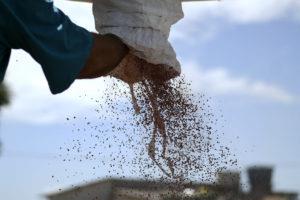(MENAFN- Brazil-Arab News Agency (ANBA))

São Paulo – The escalation of the conflict between Russia and Ukraine has had consequences for the international trade of products such as fertilizers , of which the Russians are influential suppliers. The sector is one in which Brazil is heavily dependent on foreign purchases since around 80% of the fertilizers used in the country are imported.
Fertilizers are essential inputs for the agricultural sector, with different compounds and functions. In the Russian case, according to Scot Consultoria , the country was the leading supplier of potassium chloride to Brazil and one of the largest suppliers of nitrogen and phosphate fertilizers in 2021.
In addition to Russian products, which are no longer expected to arrive in Brazil, another problem is the blockade imposed by Lithuania, through which shipments from Belarus pass, another vital source of potassium for Brazilian agriculture.
Arab fertilizers
Russia also exports ammonium nitrate and phosphates ; however, other countries can supply these fertilizers.“Concerning phosphates, I believe we can obtain them more easily so as not to be dependent on Russia. But potassium chloride is the most complicated because Russia and Belarus accounted for almost 70% of what we imported last year,” said independent consultant José Francisco da Cunha.
For the consultant, Arab countries can be an alternative for some products they are already essential suppliers, such as phosphorus , nitrogen , and urea . However, they do not have a significant potassium production.“The Arabs cannot do much with potassium because they are not producers. Now, what can change the course for them are nitrogen and phosphate. There could be an increase in purchases from countries like Saudi Arabia to compensate for what will not be imported from Russia,” he said.
Another important country in this trade is Morocco , which, according to the Brazilian Agricultural Research Corporation (Embrapa), has about 70% of the world's known phosphorus reserves. In the North African country, company OCP has a monopoly on the element and is the largest supplier of phosphorus to Brazil, serving around 40% of national imports.
Read also on agriculture: Cassava: Brazilian food that could be the new açaí
Cunha recalled the Moroccans are strong mainly in the MAP; mono ammonium phosphate.“In addition, Morocco also exports natural phosphate to supply as input to some companies that industrialize the product in Brazil,” he explained.
The Saudis are also strong sellers of nitrogen, while Qatar produces sulfur and urea. In the Arab bloc, there are also other fertilizer exporting countries such as Egypt , Jordan, which produces potassium, and Tunisia.
Price and supply
Brazil goes through the interim harvest at the beginning of the year, when short-cycle crops, such as maize, are planted to take advantage of the off-season period. This is usually a period of lower demand for fertilizers, which should become more targeted from October onwards.
In a press conference this Wednesday (2), the minister of Agriculture, Livestock, and Food Supply, Tereza Cristina, said Brazil has enough fertilizers until October.“The second maize crop is already happening, so needed fertilizers are already guaranteed. The summer harvest, in September and October, is a concern. Still, we also have confirmation from the private sector there is enough transit stock to arrive until October,” said the minister at the press conference.
Fertilizer prices were already on the rise in Brazil. According to Scot Consultoria, prices virtually doubled in 2021, raising the cost of production, especially for the 2022/23 harvest.
For Cunha, the time has come for rural producers to 'prepare for turbulence.'“As a consultant, I always say it is a time to take it easy. It is possible to have alternatives and optimize the use of fertilizers. [Concerning the supply] we have to see how the global proportion of this will be, as we will not have the supply from Russia; other countries will not have it either,” recalled Cunha.
Brazil is the fourth-largest importer of fertilizers in the world. Despite the expressive demand for the product on national soil, the Brazilian fertilizer industry did not follow the pace of growth.
With production already undersized, many plants have been discontinued, such as Araucária Nitrogenados, one of Petrobras's plants for fertilizers, which was closed. Petrobras' nitrogen fertilizer unit (UFN 3), in Três Lagoas, state of Mato Grosso do Sul, was purchased by Russian group Acron last year. The sale was announced, at the time, by the Brazilian Ministry of Agriculture, Livestock, and Food Supply (MAPA).
Translated by Elúsio Brasileiro
©Mateus Bonomi/AFP
The post Fertilizers: Arabs could supply part of global demand appeared first on Agência de Notícias Brasil-Árabe .
MENAFN04032022000213011057ID1103797998
Legal Disclaimer:
MENAFN provides the information “as is” without warranty of any kind. We do not accept any responsibility or liability for the accuracy, content, images, videos, licenses, completeness, legality, or reliability of the information contained in this article. If you have any complaints or copyright issues related to this article, kindly contact the provider above.